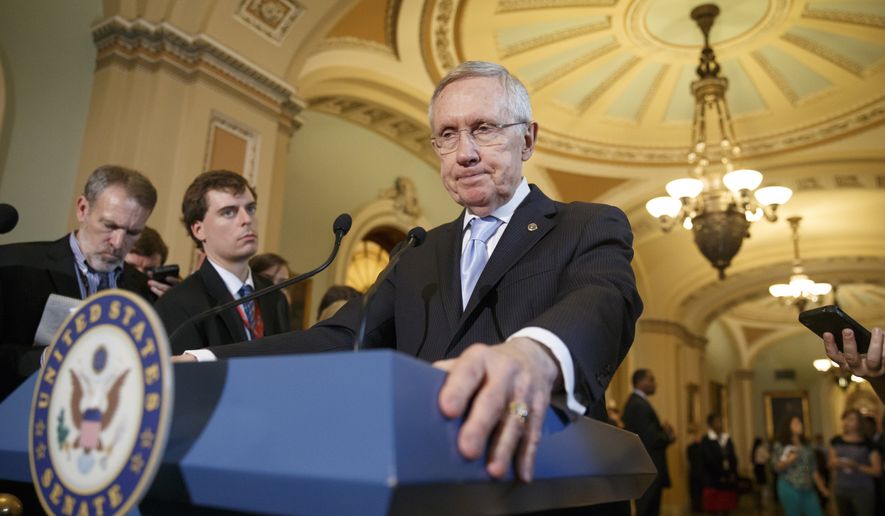Senate Majority Leader Harry Reid wants Democratic candidates to win, but it may be more important that Republican candidates lose.
That may explain why Democrats in two key races with implications for Senate control have dropped their bids, strengthening the odds for third-party candidates while creating tougher contests for Republicans.
The Kansas Supreme Court ruled Thursday that Democratic Senate nominee Chad Taylor may remove his name from the Nov. 4 ballot, leaving independent candidate Greg Orman as the only strong challenger to Republican Sen. Pat Roberts.
Meanwhile, an Alaska Republican has filed a lawsuit challenging Democratic gubernatorial nominee Byron Mallott’s decision to abandon his candidacy and run as lieutenant governor on a ticket with independent candidate Bill Walker.
Mr. Walker and Mr. Mallott announced earlier this month they would combine forces after polling showed both of them trailing Republican Gov. Sean Parnell by double digits. That “unity ticket” may not be enough to defeat the incumbent, but Anchorage political analyst Marc Hellenthal says there’s another goal: Boosting the candidacy of Democratic Sen. Mark Begich.
Mr. Begich is locked in a tight contest with Republican former attorney general Dan Sullivan, and the specter of a Parnell landslide was threatening to depress Democratic turnout.
“He [Begich] wanted a contested gubernatorial race because that helps him, in terms of bringing out marginal Democrats,” said Mr. Hellenthal, who has worked for both Democratic and Republican candidates. “They’re more motivated to vote, in other words.”
Both the Alaska and Kansas Senate contests are seen as crucial to deciding which party gains control of the chamber in November. Republicans need six seats to flip the Senate in what is increasingly viewed as a wave year for the GOP.
Mr. Orman may be running as an independent, but he has sought office in the past as a Democrat. If he wins and agrees to caucus with the Democrats, they may be able to swing a 50-50 Senate split that allows them to keep control, given that Vice President Joseph R. Biden holds the tiebreaker vote.
Kansas Republicans blasted the state Supreme Court’s Thursday ruling, arguing that Mr. Taylor’s decision to drop off the ballot disenfranchises Democratic primary voters. Secretary of State Kris Kobach ordered Democrats to choose another nominee by Sept. 26, but then agreed Friday to mail out some ballots without Mr. Taylor’s name.
Furious Republicans insist the entire process has been orchestrated by national Democrats, pointing out that Mr. Taylor’s legal team included Marc Elias, who has represented high-profile Democrats, including President Obama and Mr. Reid.
“It is depressing to see the state Supreme Court condone political gamesmanship and a national power play to deceive and disenfranchise Kansas voters,” said Kansas Republican Party chairman Kelly Arnold in a Thursday statement.
“The people of Kansas deserve to know the corrupt bargain behind this deal,” Mr. Arnold said. “Discussions with Missouri Democrat Claire McCaskill, followed by Harry Reid and Barack Obama’s personal political attorney representing Taylor, are enough to prove the corrupt Democrat bosses controlled this decision, and the local Democrats lacked the courage to fight back.”
Nor is 2014 the first election cycle the Democrats have used this tactic.
In 2002, ethics-dogged incumbent Sen. Robert G. Torricelli of New Jersey dropped his re-election bid long after having won the Democratic primary and just 36 days before a general election that polls were predicting he’d lose badly. Despite the state’s replacement-candidate law requiring an election be more than 50 days away, the Democratic Party was allowed by courts to substitute Mr. Torricelli’s name with that of former Sen. Frank Lautenberg, who kept the seat in Democratic hands.
Democrats in Alaska have also been accused of gaming the electoral process. Three candidates — Mr. Mallott and the Democratic and independent nominees for lieutenant governor — had to reject their primary nominations in order to create the “unity ticket.”
That Democrats were willing to get behind Mr. Walker signals at the very least certain desperation. Mr. Walker is a longtime Republican who agreed earlier this month to register as undeclared in order to join forces with Mr. Mallott against the incumbent governor.
Still, Mr. Walker is hardly the Democratic Party’s cup of tea: He’s a self-described social conservative who opposes abortion. As the ticket was being formed, Mr. Walker said he would veto any bill to weaken abortion rights, then took back that promise, saying he didn’t want to comment on hypotheticals.
“That’s further than I wanted to go,” Mr. Walker told the Alaska Dispatch News. “I did something poorly, and I went further than what I was comfortable with.”
• Valerie Richardson can be reached at vrichardson@washingtontimes.com.




Please read our comment policy before commenting.